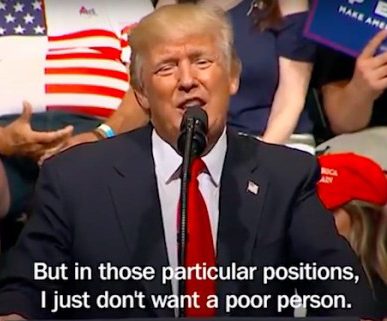In the immediate aftermath of the GA-06 defeat of Jon Osoff, who has charisma on loan from Martin O’Malley, Liberal Twitter exhorted Democrats to develop a clearer policy message. When trying to win votes, it’s better to be lucid (except when it’s not), but policy isn’t what elevated Trump to the Oval Office–he had none–or Karen Handel to Congress. In addition to Kremlin machinations and FBI blunders, what enabled the Klu Klux Kardashian to be elected was his peddling of a deeply racist, xenophobic message that found the ready ears of nearly 63 million citizens. If lots of people are voting to Make America White Again, sound fiscal policy won’t make a dent.
It’s not that Dems can’t defeat such ugliness at the voting both–they’ve done it before and even won the popular tally in 2016–but they need the right candidate more than anything else. Someone bold and broadly appealing whose authenticity is unquestioned. Easier said than done, I suppose.
In the Slate piece “A GOP Without Fear,” Jamelle Bouie, who consistently rises above the clatter, argues that Republicans don’t fear the horrendous effects of a draconian reimagining of health care, the first attempt by either party to literally murder its base, since identity politics rule the day. In other words, you can’t fall from grace when grace itself isn’t valued.
An excerpt:
It’s likely that Republicans know the bill is unpopular and are doing everything they can to keep the public from seeing its contents before passing it. As we saw with the Affordable Care Act, the longer the process, the greater the odds for a major backlash. But this presupposes a pressing need to pass the American Health Care Act, which isn’t the case, outside of a “need” to slash Medicaid, thus paving the way for large-scale, permanent tax cuts. The Republican health care bill doesn’t solve any urgent problem in the health care market, nor does it represent any coherent vision for the health care system; it is a hodgepodge of cuts and compromises, designed to pass a GOP Congress more than anything. It is policy without any actual policy. At most, it exists to fulfill a promise to “repeal Obamacare” and cut taxes.
Perhaps that’s enough to explain the zeal to pass the bill. Republicans made a promise, and there are forces within the party—from hyperideological lawmakers and conservative activists to right-wing media and Republican base voters—pushing them toward this conclusion. When coupled with the broad Republican hostility to downward redistribution and the similarly broad commitment to tax cuts, it makes sense that the GOP would continue to pursue this bill despite the likely consequences.
But ultimately it’s not clear the party believes it would face those consequences. The 2018 House map still favors Republicans, and the party is defending far fewer Senate seats than Democrats. Aggressively gerrymandered districts provide another layer of defense, as does voter suppression, and the avalanche of spending from outside groups. Americans might be hurt and outraged by the effects of the AHCA, but those barriers blunt the electoral impact.
The grounds for political combat seem to have changed as well. If recent special elections are any indication—where GOP candidates refused to comment on signature GOP policies—extreme polarization means Republicans can mobilize supporters without being forced to talk about or account for their actual actions. Identity, for many voters, matters more than their pocketbooks. Republicans simply need to signal their disdain—even hatred—for their opponents, political or otherwise. Why worry about the consequences of your policies when you can preclude defeat by changing the ground rules of elections, spending vast sums, and stoking cultural resentment?•
Tags: Donald Trump, Jamelle Bouie

